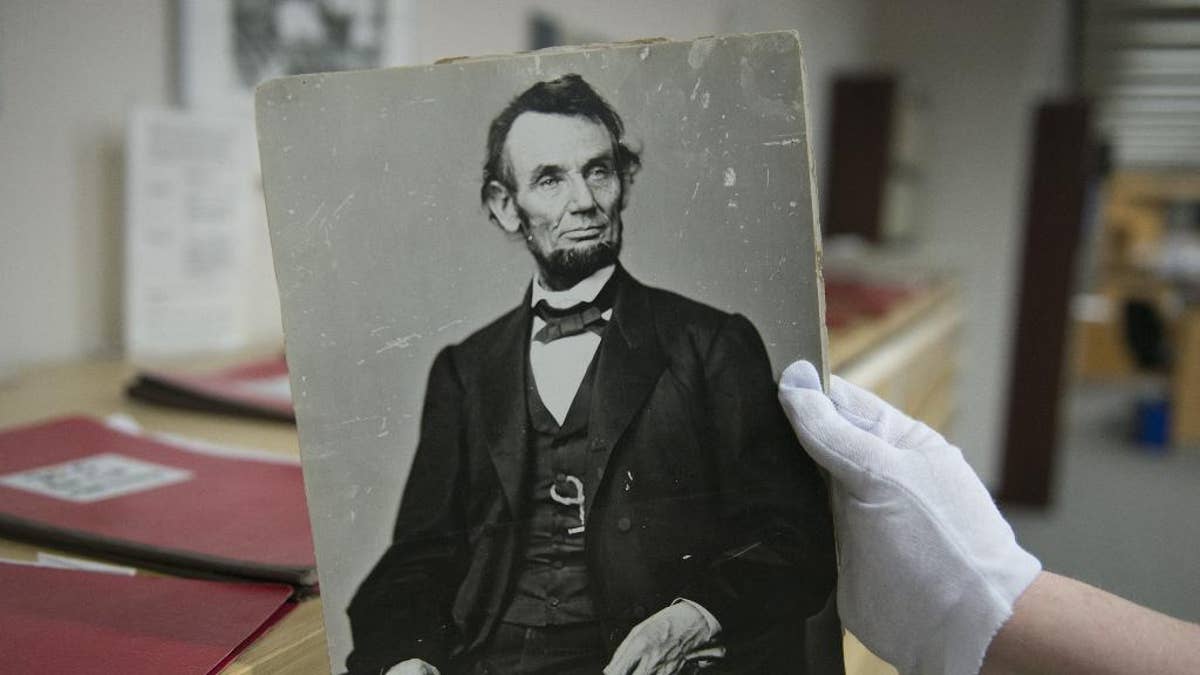
In this Monday, April 6, 2015 photo, Karen Needles holds up a photograph of President Abraham Lincoln at the National Archives in College Park, Md. Three blocks away, 150 years earlier, Lincoln was felled by an assassin's bullet. (AP Photo/Molly Riley) (The Associated Press)
Sometimes it’s hard to admit you have it wrong. It’s particularly hard to swallow when the nation collectively gets it wrong and has done so for a century and a half. But it’s finally time to correct the record once and for all — upon further reflection, we should stop referring to the killing of President Abraham Lincoln by John Wilkes Booth as a political assassination and start calling it what it really was, “workplace violence.”
In Civil War America John Wilkes Booth was quite possibly the most famous actor in the country and was even referred to as “the most handsomest man in America.”
The New York Daily News dubbed him “the man who could have been remembered as the George Clooney of his day.”
Additionally, the stage was good to Booth financially. In the late 1850s he became wealthy as an actor, earning more than $20,000 a year -- that's over a half a million a year today’s dollars.
Looking back at the facts, the media was wrong to haphazardly declare the killing a politically motivated assassination.
After dazzling audiences with his stage performances up and down the Eastern Seabord, family friend John T. Ford enticed Booth to perform at his brand new 1,500 seat theater in Washington D.C.
Booth took him up on his offer and promptly took the starring role in Charles Selby’s "The Marble Heart."
President Lincoln was a fan of the theater and watched the play from his box.
According to Lincoln historian Dorothy Kunhardt, during the play Booth aggressively shook his finger at Lincoln while delivering a line of dialogue.
Kunhardt says that Lincoln’s sister-in-law, who was watching the play with him, noticed the act of aggression and said, “Mr. Lincoln, he looks as if he meant that for you.”
Lincoln responded by saying, “He does look pretty sharp at me, doesn't he?”
On another occasion, Lincoln’s son Tad saw Booth on stage and was so awed with his performance that he invited the actor to meet the president between acts.
Booth declined this request.
On April 14, 1865, Booth entered Ford’s Theatre in Washington, D.C., as President Lincoln watched a performance of “Our American Cousin.”
He then shot the president in the head, jumped from the box to the stage, shouted “Sic semper tyrannis!” a Latin phrase meaning “thus always to tyrants,” and fled.
Looking back at the facts, the media was wrong to haphazardly declare the killing a politically motivated assassination.
Did anyone at the time bother to consider the pressures that actors are under during live performances in such a large venue?
Clearly there was some kind of history between the two men.
Author Gene Smith wrote that Booth's acting may not have been as precise as his brother Edwin’s. Sentiments like this had to be a blow to Booth’s healthy ego.
Did Lincoln share this belief? If so, it’s safe to assume that he created a hostile work environment for Booth and shares some of the culpability for this spontaneous act of violence.
But people at the time probably just weren’t sophisticated enough to understand the nature of the workplace relationship between actors and regular members of the audience.
Americans leaped to the conclusion that Booth killed Lincoln over lingering resentment related the Civil War.
This ‘rush to judgement’ prompted a predictable jingoistic response from a blood thirsty American public who were left with the impression that Booth and many of his fellow confederates weren’t peaceful lovers of the union.
One hundred and fifty years later, it’s time we set the record straight and declare the killing of President Lincoln to be an act of “workplace violence.”
John Phillips can be heard weekdays at 3 pm ET on “The Drive Home with Jillian Barberie and John Phillips” on KABC/AM 790 in Los Angeles and writes a weekly column for the Orange County Register.








































